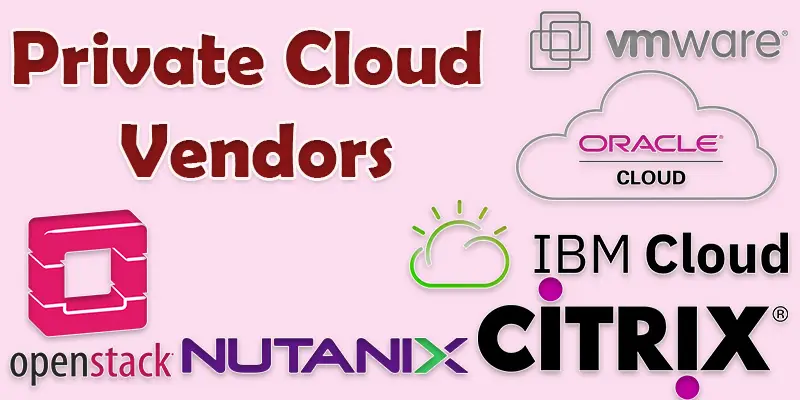Private Cloud Computing Vendors You Can Trust
Published: 10 May 2025
Best Private Cloud Vendors for Small Businesses
Private cloud providers offer secure, customizable cloud services trusted by top industries like healthcare and finance. Confused about which provider to choose or why private cloud matters at all? Many businesses struggle with keeping their data safe, managing costs, or finding reliable support. Imagine having full control of your cloud, with no noisy neighbours, just peace of mind and power tailored to your needs.
Top Private Cloud Vendors in the Market Today
Top private cloud vendors help businesses keep their data safe, private, and easy to manage with trusted cloud services.
- VMware
- Microsoft Azure Stack
- IBM Cloud
- HPE GreenLake
- Dell APEX
- Oracle Cloud
- Red Hat OpenStack
- Citrix
- Nutanix
- Cisco CloudCenter
- Amazon Web Services
- Google Cloud Platform (GCP)
- BMC Software
- DigitalOcean
- Dell Technologies APEX
- SAP
- Alibaba Cloud
- Huawei Cloud

VMware
VMware is a leading private cloud vendor known for its strong virtualization tools and easy integration with on-site systems. It helps businesses build secure and flexible private clouds that they can fully control. Example: A hospital uses VMware to safely store patient records and run medical apps without risking data leaks.
Microsoft Azure Stack
Microsoft Azure Stack is a private cloud solution that brings Azure services to your own data center. It lets businesses run cloud apps locally while staying connected to the full Azure ecosystem. Example: A law firm uses Azure Stack to keep sensitive client data on-site while still using Microsoft’s cloud tools for daily work.
IBM Cloud
IBM Cloud offers private cloud solutions with a strong focus on security, AI, and data control. It’s built for large businesses that need reliable, scalable, and secure cloud environments. Example: A global bank uses IBM Cloud to run secure transactions and manage customer data while meeting strict compliance rules.
HPE Green-lake
HPE GreenLake is a flexible private cloud solution that offers pay-as-you-go pricing, making it easy for businesses to scale their infrastructure without huge upfront costs. It’s ideal for companies needing customized cloud services with a simple, on-demand model. Example: A growing e-commerce company uses HPE GreenLake to manage seasonal traffic spikes without investing in extra hardware, paying only for the resources they use.
Dell APEX
Dell APEX is a flexible private cloud service that offers businesses pay-per-use IT solutions, making it easier to manage resources and costs. It’s perfect for companies looking to simplify their infrastructure. Example: A tech startup uses Dell APEX to quickly scale up their server capacity as their business grows, without the need to purchase physical hardware upfront.
Oracle Cloud
Oracle Cloud provides secure and scalable private cloud solutions with a focus on data management and enterprise applications. It’s ideal for businesses that need high-performance computing and advanced analytics. Example: A retail chain uses Oracle Cloud to analyze customer data and optimize inventory management across multiple locations.
Red Hat OpenStack
Red Hat OpenStack is an open-source private cloud platform that gives companies the freedom and authority to create and administer scalable cloud environments. It’s known for its strong community support and compatibility with various hardware. Example: A university uses Red Hat OpenStack to create a private cloud for hosting student records, research data, and collaboration tools across different departments.
Citrix
Citrix provides private cloud solutions that focus on virtualization, allowing businesses to securely manage applications and desktops remotely. It’s ideal for organizations that need to support a remote workforce. Example: A consulting firm uses Citrix to give its employees secure access to desktop applications and data, no matter where they work from.
Nutanix
Nutanix offers a hyper-converged private cloud platform that combines storage, computing, and networking into a single solution, making it easier to manage and scale IT resources. Example: A healthcare provider uses Nutanix to securely manage patient data and applications, ensuring fast access and compliance with healthcare regulations.
Cisco CloudCenter
Cisco CloudCenter is a private cloud management platform that helps businesses deploy and manage applications across multiple cloud environments, ensuring flexibility and control. Example: A software company uses Cisco CloudCenter to run their applications across different private and public clouds, optimizing performance and cost-efficiency.
Amazon Web Services
One of the top cloud platforms, Amazon Web Services (AWS), provides on-demand computing power, databases, and storage. It facilitates safe and rapid business scaling. Example: Netflix uses AWS to stream millions of videos daily and manage massive amounts of user data efficiently.
Google Cloud Platform (GCP)
A collection of cloud services called Google Cloud Platform (GCP) enables companies to leverage Google’s infrastructure to run apps, store data, and perform sophisticated analytics. It’s known for AI and machine learning capabilities. Example: Spotify uses GCP to deliver music streaming globally and to analyze user listening data for personalized recommendations.
BMC Software
Cloud management tools and other IT management and automation solutions are offered by BMC Software to assist companies in effectively managing private, public, and hybrid cloud systems. Example: A large bank uses BMC Cloud Lifecycle Management to automate its cloud services and improve operational efficiency.
DigitalOcean
Cloud service company DigitalOcean provides developers, entrepreneurs, and small businesses with easy-to-use and reasonably priced cloud solutions. It’s popular for its easy-to-use interface and fast deployments. Example: Slack used DigitalOcean in its early days to host and scale its messaging platform quickly before moving to larger infrastructures.
Dell Technologies APEX
Dell Technologies APEX is a cloud service that provides as-a-service solutions for storage, computing, and data management. It helps businesses deploy and manage hybrid and private cloud environments easily. Example: A retail company uses Dell APEX to scale its storage needs during peak shopping seasons without investing in physical hardware.
SAP
SAP offers cloud-based enterprise solutions that help businesses manage operations, customer relations, and data analytics. It’s widely used for ERP and business process automation. Example: Coca-Cola uses SAP’s cloud solutions to streamline its supply chain and manage global business operations efficiently.
Alibaba Cloud
One of Asia’s top cloud service providers, Alibaba Cloud, provides large data, storage, and scalable computing solutions. It supports businesses with global cloud infrastructure and advanced security features. Example: AirAsia uses Alibaba Cloud to enhance its digital platform, improving flight booking and customer service across Asia.
Huawei Cloud
Huawei Cloud provides cloud computing, AI, and big data services to enterprises worldwide. It focuses on hybrid cloud solutions and strong security for digital transformation. Example: Philippine Long Distance Telephone (PLDT) uses Huawei Cloud to modernize its telecom services and improve customer experience.
- Security and Compliance: Ensure they meet industry standards and regulations.
- Customization Options: Look for flexibility to tailor solutions to your business needs.
- Scalability: Choose a vendor that allows you to easily scale up or down as needed.
- Performance: Check for fast, reliable service with minimal downtime.
- Support and Service: Ensure 24/7 support with responsive customer service.
- Pricing Model: Understand the cost structure of pay-per-use or subscription.
- Integration: Ensure compatibility with your existing systems and software.
- Data Location: Know where your data will be stored and ensure it meets your security needs.
- Backup and Disaster Recovery: Confirm they offer reliable backup options and recovery plans.
- User-Friendly Interface: Look for an intuitive and easy-to-use dashboard.

Conclusion About Top Private Cloud Vendors for Enterprises
Private cloud solutions are a powerful choice for companies looking for more control and security. From my perspective, I suggest selecting a vendor that offers both flexibility and strong data protection features. You can take your business to the next level with the right private cloud solution. Act now and begin evaluating private cloud service providers to find the perfect fit for your organization’s needs.
FAQS
A vendor in cloud computing is a company that provides cloud services like storage, servers, or software.
Private cloud is provided by companies like IBM, Dell, HPE, and sometimes built in-house by big businesses.
Since anybody can use Google Drive over the internet, it is a public cloud.
John McCarthy is often called the father of cloud computing for his early ideas on shared computer resources.
Amazon Web Services (AWS) is the most popular cloud vendor worldwide.
Microsoft Azure is currently one of the fastest-growing cloud vendors.

- Be Respectful
- Stay Relevant
- Stay Positive
- True Feedback
- Encourage Discussion
- Avoid Spamming
- No Fake News
- Don't Copy-Paste
- No Personal Attacks

- Be Respectful
- Stay Relevant
- Stay Positive
- True Feedback
- Encourage Discussion
- Avoid Spamming
- No Fake News
- Don't Copy-Paste
- No Personal Attacks





